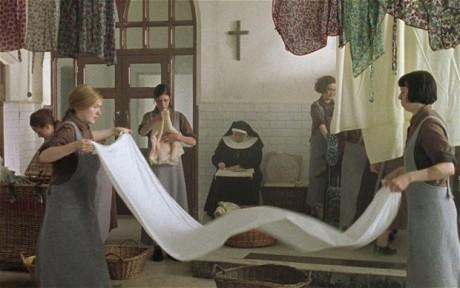How Did the Irish ...
The Telegraph UNITED KINGDOM
Whatever happened to the Fighting Irish? Once upon a time, the inhabitants of the wild, rocky patch of land next to Britain were considered among the hardiest in Europe, liable to laugh in the face of misfortune or possibly punch it square between the eyes. Now – as the publication of yet another official report into yet another "shameful episode" in Irish history confirms – the Irish have become Europe's great moaners, the nation-state equivalent of teenagers who never stop banging on about how hard they have it. From craic-loving fist-throwers to couch-hogging therapy seekers in the space of one generation… has any people on Earth ever transmogrified as speedily and wholly as the Irish? Ireland's latest report into its own horrible history focuses on the Magdalene laundries: harsh, punishing institutions through which an estimated 10,000 so-called "wayward" women passed between 1922 and 1996. Written by Senator Martin McAleese following a long inquiry, the 1,000-page report describes the nasty things some of these women experienced. Now, there is no doubt the Magdalene laundries were unpleasant places, as was every youth correctional facility in Christendom in the 1940s and 50s (the period when the laundries were at their harshest). But even so, the shock-horror headlines that have greeted the new report don't tally with the report's own findings. Irish commentators tell us the inhabitants of the laundries were "slaves" or "prisoners", subjected to "lifelong pain". But actually, the report found that 35 per cent of the women stayed in the laundries for just three months or less; 60 per cent stayed less than a year; and many of the women chose to enter the laundries – they "volunteered through impoverishment". What's more, the report found no evidence whatsoever of sexual abuse in the laundries, which calls into question at least one scene in the much-lauded 2002 film The Magdalene Sisters, which showed fat nuns perving over naked, crying girls in a laundry shower. Even within individual newspaper articles about the new report, the horror-inducing language fails to tally with the facts being put forward. So today's Irish edition of the Sun leads with an interview with the singer Sinead O'Connor headlined "IT FELT LIKE PRISON", in which "Sinead reveals Magdalene laundry agony". Yet a few hundred words later, towards the end of the article, it is revealed that Ms O'Connor wasn't actually in a laundry ("the laundries were gone [by] then", she says) and that she didn't actually suffer that much agony ("I wouldn't class myself as being abused while I was there"). It seems that, at the insistence of her father, Ms O'Connor simply spent some time in a former laundry, in what we would these days call a very tough boarding school. That's sad, and I am sorry for her. But it wasn't slavery, or prison, or evidence that Ireland is the worst and cruellest and most backward place in the world. This Magdalene report and the salacious, back-whipping commentary it has given rise to is part of a pattern in modern Ireland. This is a country that has given up on encouraging its people to forge a better future and instead implores everyone to rake up the past, excavate every long-gone instance of abuse and blab about it to the nation, preferably on primetime TV. Ireland is now less a country than an interminably long episode of the Oprah Winfrey Show, with politicians playing the role of sad-eyed therapist and the populace expected to be the screwed-up guests, confessing to having being permanently damaged by something bad that happened 40 or 50 years ago. So there have been numerous inquiries into child abuse carried out by the Catholic Church. New books discuss Ireland's "shameful asylums" and the "ignorant and cruel" treatment of mentally ill people over the past 200 years. The Famine is back in fashion: you can't swing a bag in an Irish bookshop these days without knocking over 50 books about that "genocide" against the Irish people. And on it goes, horror after horror exhumed and pored over and wept for. So sullen have the Irish become, so deadly serious and sad, that they've even lost the ability to laugh at themselves, something they were once famed for. As everyone from Julie Burchill to Robert Kilroy-Silk to black-british-superstar-should-really-have-known-better-given-his-race-163523086.html">Daley Thompson has discovered, make a wisecrack about the Irish and you will find yourself being hectored by self-elected Irish spokespeople, or possibly being investigated by the police. I guess the Irish have had such a uniquely terrible time of it over the past 10,000 years that they can't cope even with just the odd bit of Mickey-taking. Look, of course bad things happened in Ireland, as they did in every country on Earth. But this obsession with old pain and horror is deeply unhealthy. It infantilises Irish people, depicting them as the products of harsh historical experiences, as automatons shaped by abuse, when in fact they are sentient citizens more than capable of getting over the past and getting on with their lives. It also speaks to a dearth of ideas about what Ireland's future might look like; bereft of any vision for how to build a better country, Ireland's politicians and thinkers prefer to decamp to the past instead, finding it easier to tut tut at their forebears for screwing things up than to take responsibility for doing something new and different. Ireland, it's official, you're becoming boring – relax, cut loose, have a drink or ten.
|
.
Any original material on these pages is copyright © BishopAccountability.org 2004. Reproduce freely with attribution.
